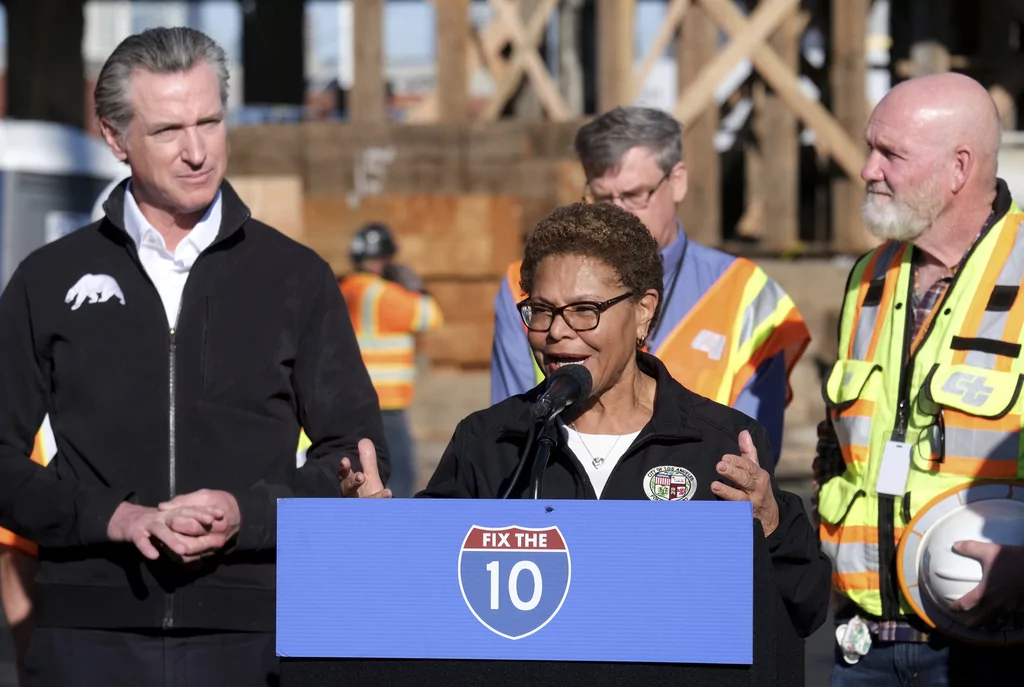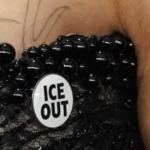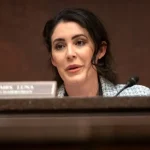
LOS ANGELES — Devastating. Apocalyptic. Of biblical proportions. Now add a phrase to those apt descriptions of the January fires that ravaged Southern California: Political.
It’s a realistic element of the fires, which killed at least 28 people and destroyed about 12,400 structures — the majority houses and plenty of businesses. Flames, which did the most damage in the ocean-vicinity Pacific Palisades blaze, the inland Eaton Fire, and several other severely damaging Los Angeles County wildfires, have led to an estimated $250 billion in property damage. That figure will, no doubt, climb significantly in the coming months.
The blazes instantly scrambled the 2026 election landscape, with Los Angeles County and its nearly 10 million people accounting for about a quarter of California’s population. Los Angeles Mayor Karen Bass, governing the nation’s second-most populous city, with about 4 million people, is on the defensive over her initial, hesitant response to the fires. More broadly, her administration’s approach to city fire department funding and related prevention policies is drawing strong scrutiny.

The fires have also upended the 2026 open-seat California governor’s race in several different ways. Due to state term limits, Gov. Gavin Newsom (D-CA) must leave office after 2026. Newsom has long politically angled himself for a 2028 presidential run as governor of the Trump “resistance” in the nation’s most populous state. His timeline got sped up, to 2028, when President Donald Trump won a second, nonconsecutive term, over former Vice President Kamala Harris, a former California attorney general and senator.
It’s far too soon to judge Newsom’s national political prospects because he’s leading California’s emergency response. He’s been fairly prominent in media appearances, trying to reassure Southland residents, particularly compared to Bass. Yet it’s an open question whether he can make a credible bid for the 2028 presidential nomination if he runs at all.
The gubernatorial race to replace Newsom has also been significantly reordered by the fires. While there are still more than 21 months before Election Day 2026, it’s fair to say now that fire damage recovery will be a dominant theme. That means candidates offering specific policy proposals on regulation of insurance companies, housing policy in the wake of massive rebuilding needs, and much more.
Before the fires, a Democratic candidate was expected to easily win the governorship, but that can no longer be taken for granted, even after Harris’s 58%-39% win in 2024 over Trump. A Republican gubernatorial candidate could, under the right political circumstances, successfully argue to voters that the fire disasters, though spurred by record-high speed winds, were compounded by longtime poor governance in the deep-blue state.
A word here about my journalistic impartiality on Southern California fire-related topics — it’s questionable, at best. Immediate family members lost their homes in the Eaton Fire, which consumed their Altadena house in that central Los Angeles County community, along with their entire block and much of the surrounding neighborhood. Those same fires destroyed the homes of several friends and their family members. The Pacific Palisades Fire, in a fashionable community overlooking the Pacific Ocean, also destroyed friends’ and acquaintances’ homes.
That’s not a plea for sympathy because I was not directly affected by the wildfires. It’s just a journalistic disclaimer.
And while it might seem too soon to consider the wildfires’ political implications, the calendar says otherwise, because just clearing all the fire debris is expected to take nine months to a year. The rebuilding process for homes and businesses is projected to last two to five years after that. Meanwhile, the 2026 all-party primaries are coming up in June next year. Then, unless a candidate wins an outright majority that day, the top two finishers regardless of party, will advance to the general election on Nov. 3.
Throughout it all, the fires’ aftermath will linger heavily. Any kind of home rebuilding, for those with relatively quick insurance payments or independent financial means, still has to go through state and local housing permitting processes. Many other fire victims didn’t have updated insurance policies on their homes, leading to a swath of additional problems.
That’s a timeline easily encompassing the next round of the Los Angeles mayoral election when Bass will presumably seek reelection. And, on an even broader stage, the California gubernatorial election, a huge political prize so sought-after that a major party contender, Lt. Gov. Eleni Kounalakis (D-CA), declared her candidacy on April 23, 2023, more than three years before the primary.
Mayoral election looms
The mayoral race is likely to be won by a Democrat because Los Angeles is a deep-blue city. Before the fires, Bass was thought to be in a strong position to win reelection for the office she captured in 2022. Polls showed voters registering high approval ratings for Bass, a former state Assembly speaker and 12-year member of the U.S. House of Representatives, where she represented a diverse district based in the lower- and middle-income neighborhoods of South Los Angeles but also taking in wealthy parts of the city’s Westside, home to multimillion-dollar homes owned by, among others, actors and other celebrities.
As mayor for just over two years, Bass built coalitions across her city and earned a reputation as an in-the-weeds manager focused on local issues such as homelessness. Yet when the fires broke out, Bass was on a diplomatic trip to Ghana. She left for the nation in West Africa nation even as weather reports showed record-high winds bearing down on the Los Angeles region, with ample warnings about wildfires.
While everyone from then-President Joe Biden to Newsom and Sens. Alex Padilla (D-CA) and Adam Schiff (D-CA) made multiple public appearances as the crisis escalated, Bass was still making her way home. The episode scuffed Bass’s long-cultivated brand as an assiduous and detail-oriented executive — and is virtually guaranteed to be raised repeatedly in the 2026 mayoral race.
Bass’s vanquished 2022 rival for the Los Angeles mayoralty, billionaire shopping mall developer Rick Caruso, quickly accused the incumbent of shirking her duties. Even partisan Democrats such as Pod Save America co-host Tommy Vietor, a national security official during former President Barack Obama’s administration and now a Los Angeles resident, blasted the mayor.
“Inexplicable decision to not come back earlier,” Vietor wrote on X.
Caruso is the likeliest challenger to Bass in the 2026 Los Angeles mayor’s race. He was a Republican for much of his life but registered as a Democrat shortly before the 2022 mayoral contest, a bow to political reality in what’s effectively a one-party city. Bass beat Caruso that year, about 55%-45%.
Caruso has been a visible presence since the wildfires erupted in early January. He’s repeatedly torn into the logistics and planning of fire prevention and fire management resources. On Jan. 12, the real estate mogul announced he and his wife, Tina, pledged $5 million to the Los Angeles Fire Department Foundation. It’s a reminder that Caruso has ample financial resources to, again, self-fund a mayoral campaign.
California governor’s race upended
The race for governorship of the nation’s most populous state figured to be a long slog. The early candidacy declaration by Kounalakis spurred several other Democratic candidates to jump in during the following months. Democratic gubernatorial hopefuls include state Senate President Pro Tempore Toni Atkins, California Superintendent of Public Instruction Tony Thurmond, former Los Angeles Mayor Antonio Villaraigosa, and ex-state Controller Betty Yee. Several other prominent Democrats could still enter, including former Biden administration Health and Human Services Secretary Xavier Becerra, state Attorney General Rob Bonta, and former Rep. Katie Porter. Caruso, from his Los Angeles perch, also could opt to run statewide rather than for mayor.
Possible Republican candidates include Riverside County Sheriff-Coroner Chad Bianco and British-born-and-raised Steve Hilton, a former Fox News host who was an adviser to then-British Prime Minister David Cameron from 2010-2012 and later became a Silicon Valley tech entrepreneur.
Normally, a Republican would struggle to even make the top two general election gubernatorial race spots. The Southern California wildfire damage, though, could change the political narrative.
A Republican candidate could use the Los Angeles area blazes, plus several in other parts of the state in recent years, as a metaphor for broader Democratic governance failures, real or perceived. Since the fires began shortly before Trump’s Jan. 20 inauguration, the president, his billionaire ally Elon Musk, and top Republicans have repeatedly blamed Democratic leadership for the crisis.
Moreover, California moved rightward during the 2024 elections. Trump lost California by a wide margin amid a 312-226 Electoral College victory. Still, his loss against Harris in her home state was considerably closer than four years before. From his 2020 loss against Biden to 2024, Trump went from 34.32% of the vote to 38.33%.
Nine California counties moved from the Democratic column to Republican, fueled by voter concerns over crime, homelessness, illegal immigration, high prices, and an intractable housing crisis. Trump increased his vote share in 45 of California’s 58 counties in 2024.
Notably, Imperial County, straddling the U.S.-Mexico border from east of San Diego to the Arizona state line, voted GOP in a presidential election for the first time since 1988. Trump had a 49.12%-48.27% edge in the county of about 180,000 people, where voters supported Biden in 2020 by 24.4 percentage points.
Trump’s strong showing in Imperial County, where the unemployment rate of 19.6% late last year was the state’s highest and more than three times the national average, reflected the inroads he made with noncollege-educated voters and Hispanic Americans. News interviews with local voters showed them repeatedly citing concerns about California’s high cost of living, gas prices, and taxes — all issues a 2026 California gubernatorial candidate could seize on.
In addition to Trump’s California gains, voters have shown some signs of fatigue with Democratic governance. California, under full Democratic control, enacted some of the most progressive policies in America. One sign of voter discontent at this is the 2024 approval of a tough-on-crime ballot measure. Proposition 36 imposes harsher penalties for drug possession and theft, including making shoplifting a felony for repeat offenders. Voters in November also ousted a pair of elected officials seen as emblematic of progressive overreach, San Francisco Mayor London Breed and Los Angeles County District Attorney George Gascón.
Coming battles with the Trump administration
Winners of the Los Angeles mayoral and California gubernatorial elections will face a tricky political dance in trying to tap a main source of Golden State resources: the federal government. Trump is back in the White House, and Republicans hold majorities in both the House and Senate.
Democratic elected officials in the state will need to show political finesses in wrangling federal resources out of the Trump administration while showing voters at home they’re still in “resistance” mode against a president reviled by their political base.
That dichotomy was on full display during the waning days of Biden’s presidency, as the Southern California wildfires raged. On Jan. 13, Democrats in California reached a $50 million agreement to shore up state and local defenses against the incoming Trump administration. Half the money will go to fending off its mass deportation plans.
CLICK HERE TO READ MORE FROM THE WASHINGTON EXAMINER
At the same time, Congressional Republicans called for strings attached to federal funds given to California for wildlife relief efforts. Ideas include forcing the state to work with federal immigration authorities and easing environmental regulations, among others.
The political bickering is playing out as tens of thousands of Los Angeles-area residents try to pick up their shattered lives and rebuild after once-in-a-lifetime firestorms. The California political establishment is likely to feel its wrath when the next set of elections come around.





